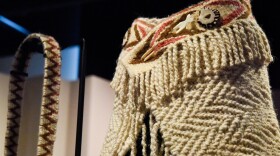When you imagine riding a bicycle in Seattle, two things may come to mind: the city’s hills and its reputation for rain.
Still, the longtime editor of the Seattle Bike Blog, Tom Fucoloro says these challenges should not deter anyone who may be considering a bike ride as part of their daily commute.
“My favorite advice is to just do it," Fucoloro said. "Give yourself more time than you think you need and just set out and try to figure it out."
Fucoloro recently arrived at our Seattle studio on two wheels, of course, to discuss his new book “Biking Uphill in the Rain: The Story of Seattle from Behind Handlebars." It spans the history of cycling in Seattle from present day all the way back to the late 1800, when bicycle shops started popping up on Second Avenue.
"The city was centered around Second Avenue. And also, Second Avenue was the first street that the city decided to pave," Fucoloro said. "So if you're gonna ride a bicycle in Seattle, there a few years there where you could basically just ride up and down Second Avenue. And that was kind of it."
Listen to the full interview above.
Interview Highlights
On how bike infrastructure started to grow in Seattle.
This group of bike riders, mostly well-to-do, white men in Seattle were really into biking and biking was pretty expensive at first. So it was sort of a high-class status kind of thing to do. And they got together and they organized their power to convince the city to levy a license on all bicycles. So if you want to ride a bicycle in Seattle, you had to pay a license. And that license fee was then used to build paths. And so they basically started where the paved streets ended.
On what happened when the car came around.
One of the surprising things I realized when researching this book, when I started thinking that like, 'oh, we had all these great paths, how did the car drivers take that away?' Like, how did the bicycle like allow that to happen?' And then researching this book, I realize, oh, the first car drivers were the bicyclists. They're the same people. That's why that happened.

On how bicycle culture evolved in Seattle in the last half of the 20th century.
So 1968 was really when what I would call the modern Seattle bicycle movement was born. And that was when the first Bicycle Sunday was held. And there was a lot of people who had gotten bikes throughout the years and they just kind of riding on their own, for the most part. When Bicycle Sunday was held, an overwhelming number of people showed up to that first event. The city was expecting a couple hundred and instead 5,000 to 10,000, depending on whose count you want to listen to, showed up. And immediately, people with bikes kind of really well, 'there's a lot of us, oh, we should probably get organized and start asking for things.' So Mayor Wes Uhlman started building out some on street bike lanes...And they started working on the Burke Gilman trail project and, and then they just kind of hit a wall at expanding the on street bike network.

On the rise and fall of the 'war on cars.'
When bike advocates started to rise in political power, there was, you know, anytime that happens, there's a backlash. And so there were a couple of years where people kept talking about this phrase, the 'war on cars' as though, someone trying to keep somebody safe is somehow attacking someone else. And so there are a couple years where there's kind of a fervor about this. And then, unfortunately, what happened is people died. And there was some roadway tragedies in 2011 that really caught a lot of headlines, and really made people rethink some of that framing. We had people who were, just like dads you know, biking home from work getting killed. These people were not warriors. They were just going home.
On how Seattle is doing making bike infrastructure equitable across the city.
Not great. They have historically done a very poor job of providing safe bikeways in Southeast Seattle, especially, but also South Seattle and West Seattle, and parts of West Seattle that are not called Alki. And what's really frustrating is that the city has claimed for years now that they want to right this problem of the past, and yet they still kind of aren't. There's still no safe way to bike to Rainier Valley from downtown, which is absurd, because it's 2023...You know, the city makes some changes around the edges, but they're unwilling to touch the real problem, which is Rainier Avenue.

On if the city can achieve its zero traffic fatalities goal by 2030.
Well it depends how serious the city wants to get. We absolutely can do that. I 100% believe that. We have a significant transportation budget, and there's gonna be a new levy that we're gonna vote on in 2024. Well, I don't know if it's gonna be a levy [but] a new funding package of some sort, in 2024 to replace the expiring Move Seattle levy. And the city right now is debating what that's going to look like. You know, if we look at our successes with Safe Streets projects, and we say 'you know what, we're going to invest to make every street safe.' We have the resources to do it. We can do it.







